By Adriane Heins
Donald Trump can achieve soaring prime-time ratings, and Hillary Clinton can pack a convention center, but in this year of campaigns and debates, a team of vice-presidents is already hard at work with no TV cameras or reporters in sight.
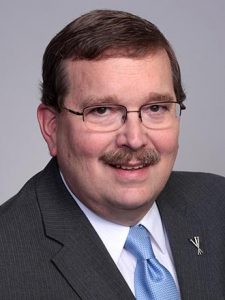
The six vice-presidents of The Lutheran Church—Missouri Synod range in age and experience, but one key aspect of their work draws on their unique gifts: visitation.
“The purpose of visitation according to Scripture is to encourage and to strengthen one another in the Gospel,” explains First Vice-President Rev. Dr. Herbert C. Mueller Jr. “We visit as a consequence of the fact that we confess, ‘I believe in one, holy, Christian and apostolic Church.’ ”
Throughout the past year, the six have assisted LCMS President Rev. Dr. Matthew C. Harrison in visiting 30 of the 35 LCMS districts. Their goal was “not to find out what’s wrong but to strengthen one another in what is good, in the blessings we have as part of a confessional fellowship,” Mueller says.
The importance of visitation
Visitation is helpful and necessary work, believes the Rev. Dr. Scott R. Murray, fourth vice-president, and each draws on his experience in the church to fulfill it.
“In my experience as a parish pastor, personal and individual contact with members can be very productive as you guide their spiritual life,” he says. “It exhibits your care for them and gives them an opportunity to express their concerns or even make a confession, to which you can apply the Word of God as forgiveness and comfort.”
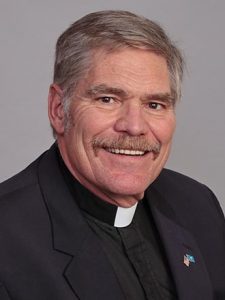
LCMS Second Vice-President Rev. Dr. John C. Wohlrabe Jr. agrees: “As an active-duty Navy chaplain for over 20 years … ongoing visitation of the men and women I served was vital to my ministry. It built trust and camaraderie so that opportunities to proclaim the Gospel abounded so that the people I served knew I was always approachable.”
Spending time with others while also offering a listening ear are critical components of visitation. “A book on visitation President Harrison has encouraged us to read says that the visitors come ‘first and foremost as fellow Christians,’” Sixth Vice-President Rev. Christopher Esget reflects. “In other words, we come not as lords but servants.”
This understanding is key, especially when the Synod can seem like “something ‘other,’ far away in St. Louis,” he says. “One of the most important aspects of pastoral care in these visitations is letting districts, pastors and congregations know, ‘You are not alone.’”
“The word ‘pastor’ means shepherd,” adds the Rev. Dr. Daniel Preus, third vice-president. “A shepherd cannot provide for the sheep without spending time with them.”
The goal of visitation, he says, then becomes identifying “the needs and concerns of the members and applies God’s comforting and saving Word to them” while demonstrating “the truth that together we are a synod, walking together in the service of our Lord.”
Explaining, clarifying, solidifying
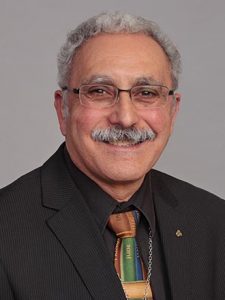
Over the course of each several-day visit, vice-presidents “experienced many opportunities to hear the issues on the minds of the district presidents, members of district boards of directors and circuit visitors in the various districts,” Mueller notes.
“During my visit, I attempted to listen carefully — as a pastor — to what is being said,” recalls the Rev. Nabil Nour, fifth vice-president, while offering “godly counsel from the Scripture and the Confessions.”
In reality, “I don’t believe there is any difference between my home visits [as a pastor] and district visits,” he says. “I am coming armed with the Word of God to give comfort and support to those who need it.”
The discussion topics vary, focusing on issues from Communion practices and worship styles, to the viability of LCMS parochial schools, to declining inner-city and rural congregations, to the increasing secularization of certain areas of the country. “These are issues for continued prayer,” Wohlrabe says, and “in each case, greater trust, confidence and camaraderie were fostered.”
“District staff and boards of directors expressed deep appreciation simply for the effort required by this systematic visitation of the districts,” Murray notes. “Often they would say that Synod had never visited them before and how much they appreciated it. To them it means that Synod was listening perhaps in a way that it hadn’t before.”
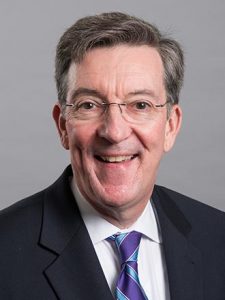
“Each district has identified the opportunities God has placed before them and sought ways to bring God’s mercy and the message of His grace to those around them,” Preus says. “We pray together that God will continue to bless the efforts of our districts to carry out His work.”
‘An enormously challenging task’
The visits were formative to the vice-presidents. They “helped Synod leaders see the context in which ministry goes on in the districts,” Murray explains. “This helped gain understanding for us.”
It adds a new aspect of experience to each man’s resume, even as they are uniquely charged and equally qualified with being “the hands, feet and mouth of the president, who can’t be everywhere,” explains Murray. As full-time parish pastor of Memorial Lutheran Church, Houston, he remains “grounded in the daily parish work of preaching to God’s people, delivering to them the Holy Sacraments and absolving their sins,” and that work is substantial, since Memorial’s weekly church attendance has, over the past six years, risen by almost 150 people. In 2015 alone, 13 East Indians have been baptized at Memorial Lutherans — 12 of them converting from Hinduism and one from Islam.
Wohlrabe, a retired Navy chaplain who has served as the president’s representative to church-relations assemblies and on the Board of Governors for Concordia Historical Institute since 2007, believes it is a “joyous privilege to accompany either President Harrison or First Vice-President Mueller in visiting the districts.” For Preus, who previously held the office of first vice-president, serving as Harrison’s representative on the Board of Regents at Concordia Seminary, St. Louis, as well as participating “in conversations with leaders of church bodies with which we may one day share church fellowship” is “of special meaning.”
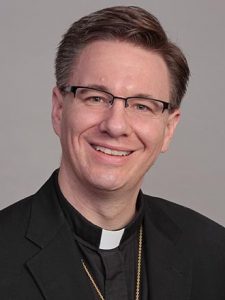
Nour, who recently retired as a parish pastor, has served as vice-president in the South Dakota District, a circuit visitor and is a well-known presenter on the Muslim faith. “Since I am a Palestinian, who by the grace of God tasted the sweet Gospel, I am in a unique situation in our beloved Synod,” he believes, “to offer, serve and provide a different view of ministry.”
Esget shepherds Immanuel Lutheran Church in Alexandria, Va. — which he describes as a “constantly changing church inside the Washington, D.C., Beltway” — where weekly church attendance has risen for the past decade, even as district and Synod numbers have decreased. In his work as vice-president, he draws on that vital parish experience, like helping to take “a parochial school from the brink of closure to the point of literally not having enough space for students” as well as caring for wounded warriors, those in youth ministry and his current work, in particular, with the Synod’s pro-life and pro-marriage efforts.
Each comes with his own distinctive set of gifts, used in service to the districts they visit and to the Synod at-large. By doing so, “congregations and pastors are not on their own without the help of fellow believers,” explains Mueller. “Jesus provides us with brothers and sisters who can help us in our faithful confession of Christ’s name before the world.”
Growing closer together
The men are in agreement: “The Synod’s mandate to visit districts has helped build community and collegiality,” affirms Murray while also giving “the opportunity for mutual consolation with the Gospel,” adds Preus. “The visitations can be a corrective to the tendency to see ourselves as separate from each other.”
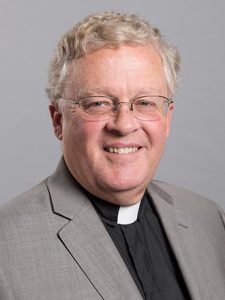
And while challenges may be unique to each district, when one struggles, visitation allows for the Church to hear and to pray along with them, Esget says: “I understand these fears and struggles but also find great reason for hope: The Lord has put us here now to stand and confess.”
“Visitation is part of the essence of what our Synod is designed to be and to do,” Mueller agrees. “We are ruled, not by a hierarchy, but by the Word of God, and we come alongside each other as brothers to advise one another from the Word of God.”
In so doing, “We look forward to helping our Synod, by God’s grace, to grow closer together in our walk with Christ.”
Adriane Heins (adriane.heins@lcms.org) is managing editor of The Lutheran Witness and editor of Catechetical Information for LCMS Communications.
Posted Oct. 22, 2015



